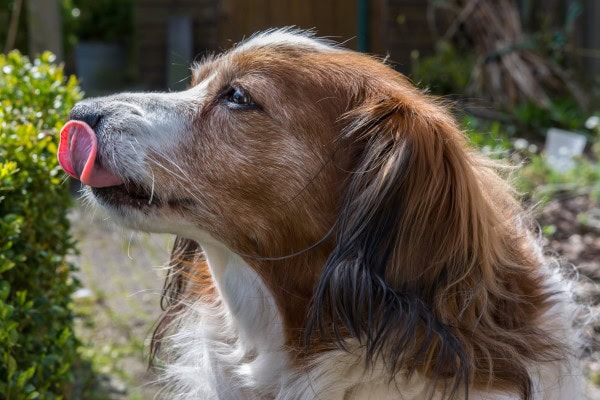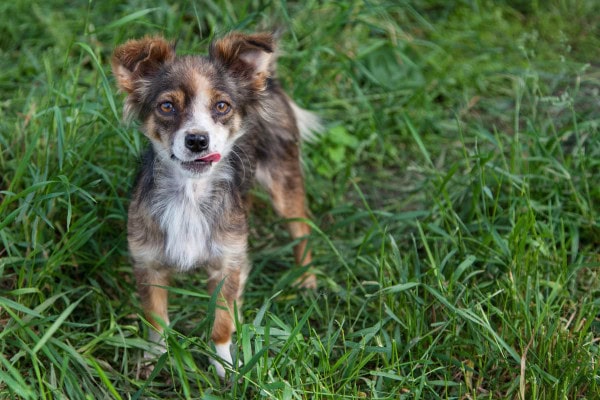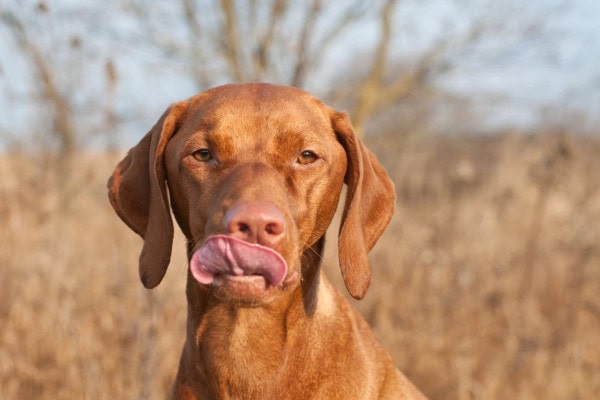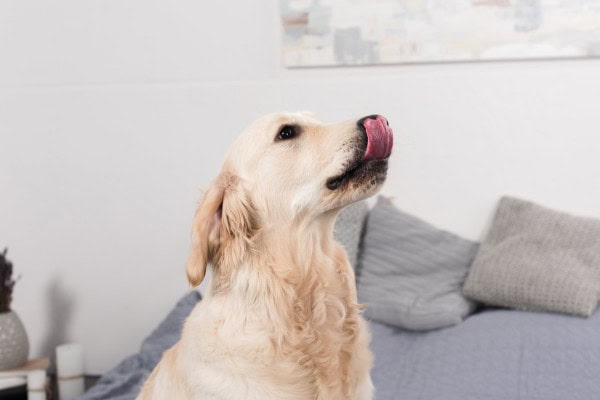When a dog is licking the air, a variety of problems could the the culprit. To help get to the bottom of this behavior, integrative veterinarian Dr. Julie Buzby explains seven reasons for a dog licking the air constantly—plus one reason it is normal for dogs to lick the air. Discover the causes of excessive air-licking in dogs and what you can do.

As a veterinarian, I love the many ways that dog parents explain what’s going on with their dogs at home. Many clients take videos or keep an event journal. But Ziggy’s mom had an entirely different approach.
She started out our appointment by asking, “Why does my dog lick the air like a lizard constantly?” Then she quickly went on to say, “Don’t laugh Doc, but this is what Ziggy is doing” and proceeded to show me her best impression of Ziggy (and a lizard).
We both had a good laugh. And then we started digging into the problem so we could find a solution for Ziggy’s lizard-like air licking.
Why does my dog lick the air?
When a dog is licking the air, a range of conditions could be to blame. Sometimes air licking is a normal behavior. But other times an underlying disease is causing the excessive licking.
Let’s start by discussing normal air licking.
Licking the air can enhance your dog’s sense of smell
Dogs already have a great sense of smell. But sometimes you may notice a dog using licking behaviors to amplify his ability to smell something interesting.
To do this, a dog may lick the air and his nose. Then he may lift up his top lip and flare his nose to open a special organ called the vomeronasal organ. This organ’s job is to detect pheromones (i.e. scent signals) in the environment. Pheromones come from other dogs, humans, or other animals. So, if your dog is sniffing and licking the air with his or her head up, your dog could be trying to determine information about a nearby dog or animal.
(Note: Sometimes this behavior is referred to as the Flehmen response. However, this is not completely accurate because the Flehmen response is not usually recognized in dogs specifically. Instead, it is associated with horses, goats, lions, and a few other large animals.)
Why does my dog lick the air excessively?
Alternatively, there are seven medical conditions that can cause a dog to lick the air frequently (sometimes to the point of feeling like your dog is licking the air non-stop).
1. Dental disease
One of the most common reasons for a dog to lick the air is dental issues—including loose teeth or having a foreign object stuck in the teeth or mouth. When something feels funny in the dog’s mouth, he or she may be more likely to lick the air. Plus, dental disease in dogs can be very painful. So licking the air may help provide some relief. Or it might be part of the dog’s attempt to move food around in his or her painful mouth.

If your dog has dental disease, in addition to licking the air, you might notice the following symptoms:
- Dog bad breath
- Decreased appetite
- Chewing abnormally or dropping food while eating
- Blood present on food or toys
- Visible tartar or plaque on the teeth
- Painful mouth or gums (e.g. the dog is sensitive when you touch the face or jaw)
- Increased drooling
- Pawing at the face or mouth (especially when a dog has something stuck in the mouth)
- Red gums in dogs
- Facial swelling (a sign of a dog tooth abscess)
- Older dog losing teeth
It is important to make an appointment with your vet if you are noticing some of these symptoms. That way the vet can check your dog carefully for oral health problems and create a treatment plan.
If it turns out your dog is licking the air because of dental issues, your veterinarian will probably recommend a dental procedure under general anesthesia. Depending on the exact problem, this may involve removing a foreign object, cleaning the teeth, performing a dog tooth extraction, or other similar procedures.
2. Seizures
Additionally, a dog licking the air could be an indication of a partial seizure. With this type of seizure activity, the dog may have involuntary muscle movements such as facial twitching, licking the air, or biting the air. Partial seizures are different from grand mal seizures, which are characterized by the dog falling to the ground and convulsing.
If you suspect that your dog is licking or biting the air due to a possible seizure in dogs, please contact your veterinarian. Prior to the appointment, it can be helpful to video your dog doing the behavior if possible. That way your vet will know what you are seeing at home.
After reviewing the video and examining your dog, the vet may suggest some additional testing such as blood tests for dogs. Many different conditions can cause seizures, so it is important to find and address the cause as early as possible. Sometimes, part of the solution involves anti-convulsant medications such as zonisamide for dogs.
3. Acute digestive upset
Instead of a seizure, a dog might also start licking the air due to an upset stomach. If your dog is experiencing nausea or acid reflux in dogs, you might notice your dog keeps licking his or her lips or licking the air. Plus, with gastrointestinal problems you may see other symptoms like:
- Vomiting
- Diarrhea
- Eating grass
- Panting
- Shaking
- Decreased appetite
- Abdomen that is painful or sensitive to the touch
- Bloody or discolored feces
- Weakness
If you notice any of these symptoms in combination with licking the air, it is possible your dog has acute GI upset. Please contact your veterinarian to determine the best course of action.
Sometimes mild problems will resolve on their own with a bland diet for dogs and time. But other conditions may require treatment. Your vet can advise you on whether you should take your dog to the emergency vet, schedule a regular vet visit, or give it a day or so.
4. Chronic GI problems
In addition to sudden digestive upset, chronic digestive diseases can also cause excessive air licking.

For example, if your dog has been exhibiting any of the behaviors mentioned above (especially vomiting, diarrhea, or decreased appetite) plus air licking for a long period of time, it could indicate he or she has an ongoing GI problem. Some potential conditions include inflammatory bowel disease (IBD in dogs), internal parasites, food allergies, stomach ulcers in dogs, or more.
In these cases, you may see symptoms every day, or they might come and go. Either way, it is important to seek help from your veterinarian. Often these conditions will not resolve on their own and when left untreated, can be increasingly more painful and frustrating for your dog (and you) as time goes on.
5. Canine cognitive dysfunction
Canine cognitive dysfunction (also known as CCD or doggy dementia) is a disease that occurs in senior dogs and acts very similarly to Alzheimer’s in people.
Sometimes, as our senior dogs age and start to develop CCD, they can exhibit repetitive behaviors including:
- Licking the air frequently
- Wandering the house aimlessly (especially after dusk or at night)
- Barking and whining at night
- Pacing
- Seeming disoriented or confused
With CCD, many of these symptoms are worse at night, which is why it is sometimes called sundowners in dogs. So, if you are wondering, “Why does my dog keep licking the air before bed” and your dog is exhibiting some of the other signs of dementia in dogs, it is possible that he or she has canine cognitive dysfunction.
In that case, please consult your veterinarian about your suspicions. This is another time when taking a video of your dog’s behavior at home can be very useful. Plus, you could consider filling out a canine cognitive dysfunction checklist for dogs before the appointment.
If your vet diagnoses your dog with CCD, he or she might recommend a special food, medications such as selegiline for dogs, supplements like Dr. Buzby’s Brain Boost™ organic MCT oil for dogs, or mental stimulation toys and games for dogs. All of these options may help slow down the progression of CCD.
6. Anxiety and compulsive disorders
Another behavioral explanation for a dog licking the air could be anxiety or compulsive disorder. While anxiety and compulsive behaviors are different conditions, they often go hand-in-hand. Many dogs who have anxiety also show some compulsive or repetitive behaviors in dogs, or vice versa.
Excessively licking or biting the air (or other items like the carpet, bed, and blankets) can be a way for dogs with anxiety to self-soothe. And the dog may yawn excessively, too.
The best way to determine if this is the cause of your dog’s air licking is to monitor when your dog is doing the behavior and determine if there are specific triggers associated with the licking.
For example, if your dog begins licking the air when overly excited or if there is a change in the environment (such as a new person coming into the house, the doorbell ringing, or someone leaving), this could indicate it is anxiety-related.
Or, sometimes the licking could be associated with trauma, stress, or fear. If your dog is afraid of baths or going for car rides and only licks the air during those activities, the licking is most likely related to fear and anxiety. Additionally, you may notice anxiety-induced licking during fireworks, storms, or other loud noises.
If you notice your dog is licking the air and it correlates with a potential stressor, please let your veterinarian know. There are many resources to help desensitize dogs and help them move past their fear. And anti-anxiety medications like trazodone for dogs can be a good option for dogs who are very anxious or fearful.
7. Allergies or skin disease
If your dog is licking the air and licking his or her paws (or other body parts), it could be due to allergies or another type of skin disease. Some potential skin problems include bacterial skin infections (i.e. pyoderma in dogs), fungal skin infections (e.g. ringworm or dog paw yeast infections), external parasites (e.g. fleas, ticks or mites), or the presence of foreign material in the skin (e.g. foxtails in dogs).
Allergies and other skin diseases are very irritating and can even be painful for some dogs. As a result, affected dogs may exhibit air licking plus excessive licking and biting of the paws, abdomen, and other areas. And dogs with skin issues can have additional symptoms including:
- Hair loss
- Fur discoloration
- Excessive eye tearing
- Red or warm skin
- Swelling of affected areas
- Bleeding skin from excessive biting or chewing
- Signs your dog is in pain when touching the skin
- Dog is limping (especially if the paws are affected)
- Crusts, pimples, or other abnormal areas on the skin

If you see these symptoms or notice that your dog licks the air when scratched, please take your dog to the vet. Skin problems can be very uncomfortable for dogs, and they usually do not resolve on their own. Thus, your veterinarian will play an important role in diagnosing and treating your dog’s skin issues.
Please be aware that treating skin disease can take time and multiple visits to the vet. And you will most likely need to administer medications (e.g. antibiotics or allergy medicine for dogs) and/or apply topical products (e.g. shampoos or mousses) to your dog’s skin. If your dog does have skin problems, it is important to be patient and thorough with your dog’s care at home. This can help your dog’s healing go as smoothly as possible.
Now that you know some of the most common reasons for dogs to lick the air, you are probably wondering how to stop all the air licking.
How do I stop my dog from licking the air?
As you have gathered, the first step to stop air licking is to understand why your dog is licking so much.
Once you and your veterinarian know the cause of your dog’s air licking, your veterinarian can help you develop a treatment plan. Hopefully, after your dog starts treatment (or completes it), you should see the licking improve. However, if the licking continues, it may be necessary to look for an additional cause. Sometimes, a dog may have more than one condition going on at the same time that is contributing to the air licking.
In Ziggy’s case, when I looked in his mouth, I saw he had moderate dental disease and a few teeth that needed to be removed. So, we scheduled a dental cleaning. After his procedure, Ziggy’s mom noted that he only licked the air for the first few days while his mouth was healing. And then, he stopped licking completely. She was so relieved to not hear that sound throughout the day anymore!
Partner with your vet to stop your dog from licking the air
Thankfully, excessive air licking itself is not usually harmful. But, the reason for the licking can be. By monitoring your dog at home, recognizing what triggers the licking, and taking videos to show your veterinarian, you can help figure out the reason behind the licking. Once the licking and underlying problem are fixed, I’m sure you and your dog will feel much better!
Why was your dog licking the air?
Please comment below.


Hi our pup Kado is a husky she’s going to be 5 this October. She sometimes licks her bed during the night or very early morning I tell her to stop nicely, She will stop and go back to sleep. She has treats that we put into a Kong bone. She loves them and will bring us her bone when she wants more. Lately she has had her bone and chews away at the treats and then after she’s done it’s like she’s chewing the air. She keeps smacking her gums like she’s still chewing . It goes on for a few minutes. Last night she did it and I started rubbing her back and head to comfort her and she finally stopped. My hubby and I also put our fingers in her mouth to make sure something wasn’t stuck in her teeth or mouth. It’s very strange we’ve both had different breeds before we got together and together we’ve had 3 different breeds of dogs and never seen this chewing air before. Our white dog Dakota was part German Shepard/Pyrenees/husky. She used to lick her bed but she was also had anxiety and she was abused before we got her. She only did it at night. She also passed earlier than she should have with stomach cancer.
I get so worried that Kado is sick or something. She had her blood tested for heart worm and other tests and she was clear. But they also only got a 1/2 teaspoon of her blood she wouldn’t sit still for the blood work. If they have to check again she may have to have a sedative so they can take her blood properly. Just wondering if it’s more like an anxiety/stress/behavioural issue or a seizure. Thank you.
Hi Michele,
I understand your concern for Kado and think it is wise you are taking this strange behavior seriously. Without being able to examine her myself, it is hard to offer specific conclusions or recommendations. I do think it would be good to have your vet to a thorough evaluation including lab work and a full oral exam. I understand this may require sedation, but I would hate to think this could be a painful tooth and it is allowed to continue progressing toward an abscess just because of your girl’s high level of anxiety when going to the clinic. Hoping your vet can run the necessary tests to get a definitive diagnosis (even if it turns out to be behavioral). Praying for an easy solution and many happy days ahead for your sweet girl.
I have a dog that does this but only after she’s been to grooming. We have found she does have grand mal seizures so I don’t know if it’s part of that or not but she’ll do it for about a week after she gets groomed or goes in for any sort of veterinary procedure. It seems like it’s a type of seizure, but it only happens when she’s in stressful situations.
Hi Terry,
That is so strange! I agree this does sound like seizure activity, but it is puzzling to me that the stress would cause this to continue to occur for over a week. It may not require treatment but there could be something to help minimize the symptoms. If you have not discussed this behavior with your vet, I highly recommend you bring it up at your next visit. Also, you can always ask for a consultation with a neurologist if needed. Here is a link to another article with more information: Psychomotor Seizures in Dogs: Symptoms, Diagnosis, and Treatment
Hoping you can get some answers and ensure your girl has many happy days ahead.
My 5 year old GSD goes on licking sprees for none of the above reasons? Mostly, if we give him a snack or if he’s allowed to lick the ice cream bowl, that’s when he goes into a full blown escapade. He’ll lick the couch, the blanket, his legs, EVERYTHING. I’ve never seen anything like it.
Hi Joy,
Wow! How strange! I too am puzzled as to what could cause your boy to exhibit this crazy behavior. Maybe you can catch one of these episodes on video to show your vet. Wishing you both all the best. Take care!
You nailed this one. Took me awhile to realize my boy had a dry mouth & his dry food was getting stuck between his teeth & the backside of his mouth. I had to stick my finger in his mouth to loosen it for him until I began putting a little water or beef broth in his food. That solved the problem.
Hi Sheri,
I am so glad you were able to find the cause and solve this problem for your pup. Thank you for sharing your experience with us. Best wishes to you and your sweet boy!